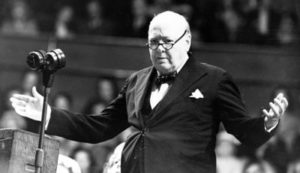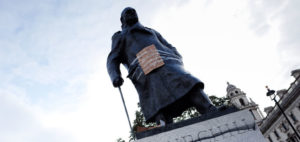In the first days of 2014, the then-education secretary, Michael Gove, addressed the forthcoming centenary of the First World War. “It’s important that we don’t succumb to some of the myths which have grown up about the conflict in the last 70 or so years,” he urged, before citing, as an example, the television series Blackadder. For a sitcom that had ended a quarter of a century earlier, an attack by such a senior politician was quite the tribute. More than that, it was an admission that the Right was losing the culture war over history.
The Black Adder, as it was originally titled, is 40 years old this week, first airing on 15 June 1983. After a shaky start, it would run for four series, though in its day it was never as popular as the other great historical comedy of the decade, ’Allo ’Allo. But its 24 episodes, spread across four time periods, have secured a cherished place in the British TV pantheon: second greatest sitcom ever, according to a 2004 BBC poll of the public; 16th greatest programme ever made, according to the British Film Institute in 2000.
At the time, it wasn’t considered to be as controversial as Gove suggests, overshadowed by far noisier arguments about Britain’s history. A few months before Blackadder was first broadcast, it had been suggested to Margaret Thatcher that what she believed in were essentially “Victorian values” — and she leapt at the phrase with great enthusiasm. When she was asked to identify which bits of the 19th century she particularly approved of, she ran through the standard list — thrift, charity, personal responsibility — and added “the British Empire that took both freedom and the rule of law to countries that would never have known it otherwise”.
Her words were carefully chosen at a time when the public interpretation of the Empire was a contentious issue. It was an era of TV dramas such as The Jewel in the Crown and The Far Pavilions, of films Heat and Dust, A Passage to India and, biggest of all, David Attenborough’s Gandhi. When it won eight Oscars in 1983, an editorial in the Daily Mirror celebrated the man who “took on the mighty British Empire at the peak of its power and defeated it”. It was, it said, a film that had been made by a “new Britain” that Thatcher didn’t understand, one in which Gandhi was a hero and which “matched the mood of the moment, especially among the young”. (Though Attenborough also claimed that, were he still alive, Gandhi would have voted for the SDP.)
The other reason Blackadder wasn’t seen as controversial was simply that it was a comedy. When the BBC broadcast Alan Bleasdale’s First World War drama The Monocled Mutineer in 1986, its treatment of an Army deserter was met with a barrage of complaints; it was “blatant Left-wing bias”, complained Tory MP Neil Hamilton. Blackadder Goes Forth — the series to which Gove was to take belated exception — attracted no such condemnation in 1989, despite its depiction of the conflict as a futile, idiotic exercise in slaughter. Comedies weren’t taken seriously.
But even as the Right was winning the economic battles in the mid-Eighties, some were beginning to worry that it was losing on the cultural front. John O’Sullivan, later an advisor and speechwriter for Thatcher, wrote of how popular culture had been “invaded” by moral equivalence, undermining the West’s authority in the Cold War. It still wasn’t comedy that concerned him — more the replacement of John Buchan by John Le Carré as the country’s favourite thriller writer — but he was sure that there was a concern here: “This invasion may be more significant than at first appears. Popular culture, after all, is one important way in which national myths and loyalties are transmitted.”
And those myths were important in shaping national identity. The counter-balance was to be found in education, in the teaching of history, where the focus should be on social cohesion and unity. And if the “national myths” that were taught turned out to be not exactly the truth, the whole truth and nothing but the truth, then that could be dealt with later on. “We must learn loyalty before we learn scepticism,” O’Sullivan wrote.
This chimed with the views of Thatcher’s education secretary and mentor, Keith Joseph, who called for schools to foster “through the teaching of history, a sense of pride in one’s country and its achievements”. This was not happening because, as the Daily Mail explained in a 1990 editorial, for 20 years, “Left-wing educationalists have been given a free rein to denigrate this country’s past, to scorn its achievements, to make children almost ashamed to be British”. It was a particularly British phenomenon, argued John Rae, ex-headmaster of Westminster School: every American or French child learned about their respective revolution, but the same was not true in Britain of the Glorious Revolution. There was too much Peace Studies, not enough Civil War. Joseph’s successor as education secretary, Kenneth Baker, was shocked to discover that more children could tell the difference between a brontosaurus and a tyrannosaurus than could distinguish Charles I and Oliver Cromwell.
It was Baker who supplied the supposed solution: the national curriculum, a centrally approved agenda that would specify what was to be taught in primary and secondary schools. At its core, said Baker, should be “the history of Britain, the record of its past and, in particular, its political, constitutional and cultural heritage”. Or, in the words of a delegate to the National Union of Teachers conference, “the purpose of the national curriculum is to sell the ideas of present-day capitalist society, market values, profit, the beauty and joys of the British Empire”. As John McGregor, the next Tory education secretary, pointed out wearily: “History is by far the most political subject.”
The national curriculum was introduced in 1989 and was intended to be a decisive moment in reversing the advances made by the Left. You may have noticed, however, that it didn’t prove to be the last word in the debate. A 2021 Daily Mail editorial was still using exactly the same language when denouncing “those who love to denigrate this country’s history”. On the other hand, Sathnam Sanghera told a literary festival this week: “No country is as far behind in talking honestly about Empire than Britain.”
Much of the dispute comes down to the issue of what history is for. Sometime historian and erstwhile Labour MP Tristram Hunt once complained that “history on television is in danger of telling comforting stories about ourselves to ourselves, rather than confronting the past”. He was probably right — but there remained the question of whether that’s such a bad thing. Maybe people prefer comfort to confrontation. There’s a huge public appetite for television drama covering a wide spectrum of British history, from Wolf Hall and The Tudors, through Victoria and Downton Abbey, to The Crown and Call the Midwife. It’s possible to enjoy, to be engaged and stimulated, even to learn without having to confront.
In any event, confronting the past doesn’t necessarily bring any clarity. When an opinion poll in January 2016 asked how people saw the British Empire, 44% said it was something to be proud of, 21% said something to be ashamed of. When the same question was asked in August 2020 — at the height of the Black Lives Matter protests — both figures had fallen significantly, with the largest group now the 40% (nearly doubled since 2016) who couldn’t say whether they were proud or ashamed.
Maybe there’s a parallel between O’Sullivan’s “we must learn loyalty before we learn scepticism” and how most of us understand, say, physics. I’m aware, in an abstract, ill-informed sort of way, that Newtonian mechanics don’t apply at a sub-atomic level or when approaching the speed of light, but it doesn’t really matter to me; I find Newton perfectly sufficient in my life. I “know” — because I’ve been told — that the atoms making up the table at which I’m sat are mostly empty space, but I can still work on the assumption that it’s a solid surface.
I don’t feel the need to confront my simplistic understanding of gravity; rather, the predictability of matter is comforting in its certainty, even if it’s not the whole picture. Likewise, national myths. There’s a point to them, a usefulness in a common identity. Social cohesion is manifestly a good thing, and so too is patriotism.
The stories that comprise that mythology change, of course (despite the slow-thinking likes of Otto English furiously tilting at windmills that were left derelict four decades ago). Michael Gove recognised that when he complained about the “myths which have grown up” around the First World War, and called for greater nuance in our understanding. He was right: the assumptions that underpinned Blackadder Goes Forth were crude and narrow. But that interpretation of the conflict — “a series of catastrophic mistakes perpetrated by an out-of-touch elite”, as Gove summarised it — is now part of the national mythology.
Even if it sometimes feels as though there’s been a 40-year stalemate in the culture war to end all war, myths evolve. And that process is influenced more by TV such as Blackadder than by the national curriculum. Which is one in the eye for Conservatives — or, as Edmund Blackadder called them, “fat Tory landowners who get made MPs when they reach a certain weight”.
Disclaimer
Some of the posts we share are controversial and we do not necessarily agree with them in the whole extend. Sometimes we agree with the content or part of it but we do not agree with the narration or language. Nevertheless we find them somehow interesting, valuable and/or informative or we share them, because we strongly believe in freedom of speech, free press and journalism. We strongly encourage you to have a critical approach to all the content, do your own research and analysis to build your own opinion.
We would be glad to have your feedback.
Source: UnHerd Read the original article here: https://unherd.com/



